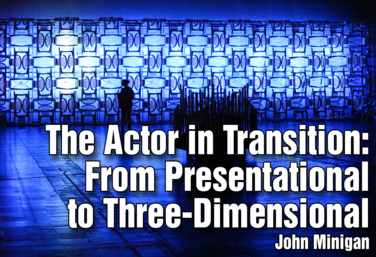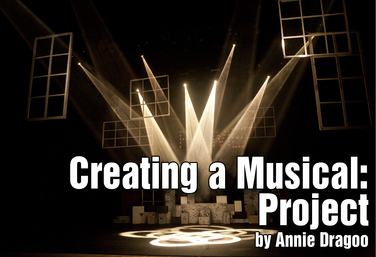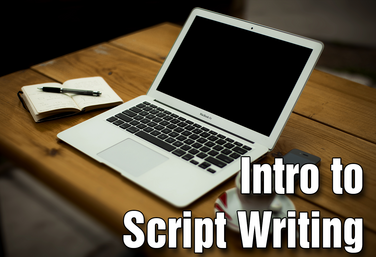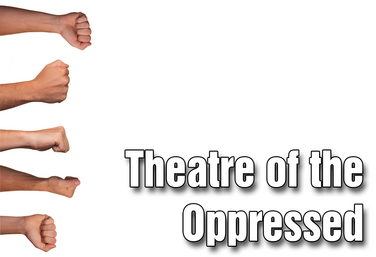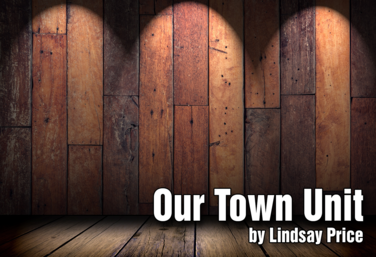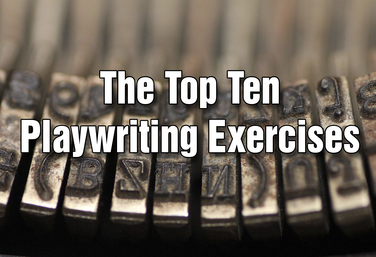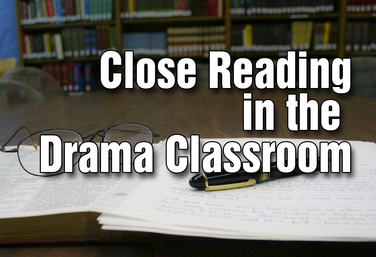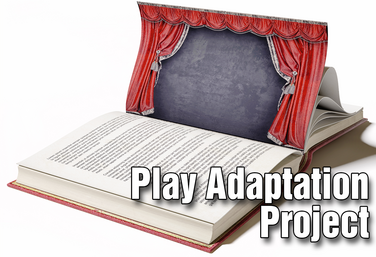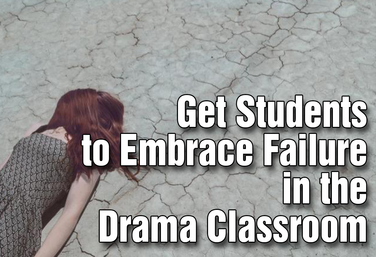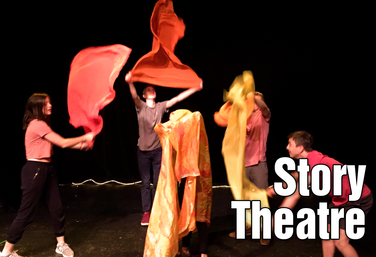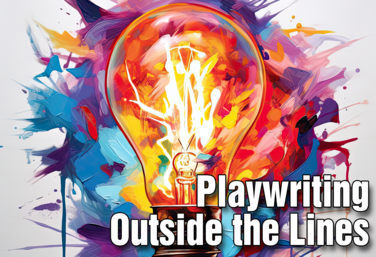Tennessee Theatre Curriculum Standards
GRADES 6-8
View all Standards for Tennessee Theatre Curriculum Standards
1.0 Script Writing Students will write scripts through improvising, drafting, and refining scripts based on personal experience and heritage, imagination, literature, and history.
Theatrical Arguments: Pursuing Objectives, Communication, and Conflict
by Rachel Atkins
In this middle school unit by Rachel Atkins, students will explore how to strengthen a theatrical argument through objectives, communication, and conflict: What characters do, what they say, and how they say it when they make an argument or try to achieve an objective. To do this, students will use tableaux, dialogue, and improv. There are presentations and post-lesson writing assignments that you can use for assessment.
How do characters, actors and writers use a variety of actions to achieve an objective or support an argument? How do they enhance their communication by word choice and emotion? How do they develop and strengthen their own arguments by understanding other points of view?
Read More...
Read Less...
The Actor in Transition: From Presentational to Three-Dimensional
by John Minigan
The objective of this unit by John Minigan is to move students from a traditional presentational model of performance to a three-dimensional model. You’re going to achieve this by having students
- Develop tactics to achieve character goals, despite obstacles
- Connect physical choices to scene structure and relationships
- Clarify tactics and story rather than forcing emotion
- And focus on the scene partner rather than the self
This unit was created to use with grade nine students as a transition from middle school to high school acting approaches. It would also be appropriate for a beginning-of-the-year unit for a program that includes Drama 1. But any class that is at the beginning of their acting process will find value.
Each lesson comes with an engagement Rubric to assess how students participated in the activities and discussions.
Read More...
Read Less...
Creating Your Own Musical
by Laramie Dean
Instructor Laramie Dean uses this unit as the final project for his Drama 2 students. Drawing upon any of the skills students have developed throughout they create a product that could be used within a new piece of musical theatre.
Students start by analyzing three musicals, study guides included, and practice creating musical elements. They are then giving class time to prepare in groups as many elements as their can for a new musical using devised theatre techniques.
There are 24 lessons in this unit which culminates in a final assessed performance.
Read More...
Read Less...
Creating a Musical: Project
by Annie Dragoo
Want a fun project that has your students collaborating and creating? In this unit by Annie Dragoo, students in groups will write and perform an original musical by adding modern songs to a traditional fairy tale story.
The six lessons take students from writing their script, to choreography and planned movement, to rehearsing, performing and evaluation.
The Rubric will focus on student performance. That means vocal delivery, emotional delivery, blocking/choreography, energy, focus, and characters.
Read More...
Read Less...
Part of the Middle School Curriculum
Unit Five: Intro to Script Writing
by Lindsay Johnson
In this unit, students learn how to write their own scripts using correct formatting. These scripts will be more detailed than the contentless scenes. Students will learn how to write dialogue that provide information about relationships, conflicting objectives, and setting.
They’ll also learn how to correctly add expression and movement directions into the script itself. The unit will end with a partner script writing assignment which is performed in front of the class.
Read More...
Read Less...
Part of the Middle School Curriculum
Unit Eight: Theatre of the Oppressed
by Lindsay Johnson
Students will have a chance to merge their understanding of scene elements with their improvisation skills in this final unit based on Augusto Boal’s Theatre of the Oppressed. Theatre of the Oppressed is a style of theatre specifically created to highlight the injustices of power and oppression in society and to problem-solve ways to bring about change.
Starting with image theatre techniques to identify issues of power and oppression, students will then use forum theatre to create scenarios of oppression taken from their own lives and improvise realistic solutions.
The unit culminates in a performance in which students participate as both actors in a scene they create themselves and spect-actors in scenes created by their peers.
Read More...
Read Less...
Our Town Unit
by Lindsay Price
This is a read, discuss, and apply literature unit. Students will study the play Our Town by Thornton Wilder.
Our Town is often referred to as “nostalgic.” It’s seen as an antiquated look at a moment in time. But this play is called Our Town, not My Town. What’s happening in Grover’s Corners happened in the past, the distant past, in our present, and even in the future. The themes of the play—the ordinary versus universality, the concept of time, the cycle of life, the ignorance of humanity to the eternal—these are just as relevant in the twenty-first century as they were when the play was written.
The purpose of the unit is not to have students recall knowledge about the play. Students will be able to identify, articulate, and dramatize text themes and concepts and compare/contrast these concepts to their own experiences.
Read More...
Read Less...
The Dilemma Project
by Claire Broome
The Dilemma Project is based on a situation that requires a decision: push a button and get a great reward, but there’s also a great consequence. Don’t push the button and there’s no reward.
This unit will lead to a group performance including characters, costumes, set, acting theory, acting tools, and a student written script. The final script will be about ten pages in length which means roughly ten minutes of stage time.
Read More...
Read Less...
The Top Ten Playwriting Exercises
by Lindsay Price
The Top Ten Playwriting Exercises Course not only gives you ten great exercises to ease your students into the playwriting waters, it's also going to give you the confidence to teach playwriting to your students.
Each exercise comes with instruction, why the exercise is important, how to assess the exercise and something specific for you to try.
Many of the modules include assignments and rubrics so you will be fully prepared to comprehend, apply and teach every these exercises.
Read More...
Read Less...
Close Reading in the Drama Classroom
by Lindsay Price
Close reading is an activity that puts curriculum standards into practice and it can be easily applied to the drama classroom.
Close reading asks a lot of your students. They have to read and think at the same time.
This course teaches drama teachers how the close reading process works, and gives them exercises and tools to apply it in the classroom.
Read More...
Read Less...
21st Century Skills Through Devising
by Allison Williams
Allison Williams leads the course: 21st Century Skills Through Devising. This course covers what devising is, why to do it, how to do it, and how your students can master the 21st Century Skills of collaborations and cooperation, critical thinking, creative thinking through devising.
High school is a great place to try devising with your students. But it’s not something you want to throw at your students without any preparation. Framework is important and this course takes you through a number of exercises you can take into the classroom tomorrow to help build a place of physical safety, a place where students work at making a lot of choices instead of waiting for the perfect choice, and a place where students feel comfortable making creative choices. The material also reviews the process of putting together a show from the idea/research stage to editing, to giving feedback.
Your students have what it takes to create their own material, collaborate with each other, and have a unique theatrical experience!
Read More...
Read Less...
Play Adaptation Project
by Lindsay Price
Adaptation is a fabulous classroom project: it requires students to analyze, adapt, modify, plan synthesize, devise. All the higher order thinking skills.
But you can’t just throw a narrator into a script and call it a day. You have to have a preparation process leading up to the writing process.
In this course you will learn practical exercises and a path to prepare your students to take on their own adaptation project. We’ll look at the guidelines to adaptation, things to think about when choosing a text, how to analyze the source material and writing that first draft.
So join me, Lindsay Price, in the Play Adaptation Project.
Read More...
Read Less...
Get Students to Embrace Failure in the Drama Classroom
by Lindsay Price
This course by Lindsay Price explores strategies you can use to encourage students to embrace failure rather than see it as a point of shame or something to hide from.
Our goal for students is to embrace a try/fail/try again/fail/try again/succeed formula. Each module in this course comes with exercises and activities that you’ll be able to take into the classroom right away.
It’s one thing to talk about embracing failure, it’s another to give students practical tools to help them achieve that goal. Join Lindsay in getting students to embrace failure in the drama classroom as we look at Failure from a Yes! perspective.
Read More...
Read Less...
The Dilemma Project
by Claire Broome
Moral dilemmas are not only faced by characters in gripping plays, but are also faced by our students. The project outlined in this course will help students develop their critical thinking skills through the use of one of the dilemma questions to shape a student written production.
If you had the choice to press a button and earn $25,000,000... but a species (not of your choosing) would become extinct, what would you do? More importantly, what would your character do?
Join drama teacher and playwright Claire Broome through this course which includes role-playing, Stanislavski’s Magic If, character creation, playwriting and staging.
Read More...
Read Less...
Story Theatre
by Matt Webster
Instructor Matt Webster believes that Story Theatre is one of the most creative, most imaginative, most unique forms of theatre ever to make its way to the stage. His course introduces the style of theatre called story theatre, explores the steps needed to choose the best stories to perform, explains how to adapt a story into a script, and demonstrates a variety of story theatre styles from simple and contained to complex and crazy and everything in between.
When you are finished with this course, you’ll be able to bring nearly any story to any stage and present it to any audience. That is the power and promise of story theatre. Learn how to bring the page to the stage.
Read More...
Read Less...
How to Give Feedback to Student Playwrights
by Nicholas Pappas
The two big questions we’re going to answer in this course are: What is feedback? And, What is useful feedback? Now, if you asked a hundred people to answer these two questions, you’ll likely get a hundred different answers, but at its core, all the answers will focus on giving notes that will improve the work, which, in this case, is our student’s plays. And, as a teacher, that’s what your hope is, right? To help your students improve as writers, one work at a time.
We want our students to write, and to grow through their writing. If we want our students to get better, we need to get better. Understanding the definition of feedback, and understanding how to provide useful feedback is the key to all of us getting better.
Join Nick Pappas in this course designed to give you the tools to help your student writers find their voice.
Read More...
Read Less...
Playwriting Outside the Lines
by Steven Stack
Instructor Steven Stack leads this course in a unique way to teach playwriting. He will show you how to set foundations and guide posts for your students, and then give them freedom to play. The intent is to help students develop their own voice and create for creating sake. The 5 modules lead teachers through how to use this style of teaching playwriting, and includes handouts and resources to support the learning.
Read More...
Read Less...
View all Standards for Tennessee Theatre Curriculum Standards Standards Master List
© Copyright 2015-2025 Theatrefolk
.png)
